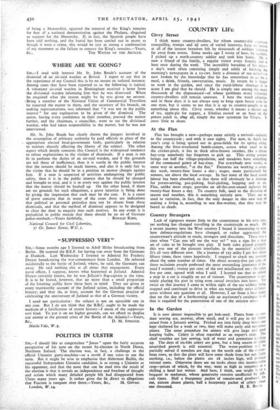WHERE ARE WE GOING?
read with interest Mr. St. John Reade's account of the dismissal of an air-raid warden at Bristol. I regret to say that in the experience of my Council this is by no means an isolated instance. Among cases that have been reported to „us the following is typical. A voluntary air-raid warden in Birmingham received a letter from the divisional warden informing him that he was dismissed. When he enquired what the reason might be he was given no answer. -Being a member of the National Union of Commercial Travellers he reported the matter to them, and the secretary of his branch, on making representations, was informed that "it was not in the public interest" for any explanation to be given of the dismissal. The union, having every confidence in their member, pressed the matter further, and the chairman, a councillor, went to see the divisional warden, who had taken responsibility in the matter, but he was not interviewed.
Mr. St. John Reade has clearly shown the dangers involved in the assumption of arbitrary authority by paid officials in place of the appropriate elected local-government body, particularly in relation to matters directly affecting the liberty of the subject. The other aspect which deeply concerns this Council is the widespread tendency to refuse explanations to the victims of dismissals. If a man is not fit to perform the duties of an air-raid warden, and if the grounds are not those of inefficiency, then it is surely in the public interest that the reasons should be made known, and also it is only fair to the victim that he should be in a position to answer charges against him. If a man is suspected of activities endangering the 'public safety, then it is in the public interest that he should be charged and brought to trial, and it is in every way against the public interest that the matter should be husheli up. On the other hand, if there are no grounds for such allegations, a grave injustice is tieing done by giving the impression that such may be the case. It is a cause of grave concern that in many of the cases there are indications that political or personal prejudice may not be absent from these dismissals, and that the method Of dismissal appears to be designed to close the door to enquiry into such motives. In any event it is prejudicial to public morale that there should be an air of Gestapo police-methods.—Yours _faithfully, • RONALD KIDD, National Council for Civil Liberties, Secretary.
37 Gt. yames Street, W.C. I.


























 Previous page
Previous page